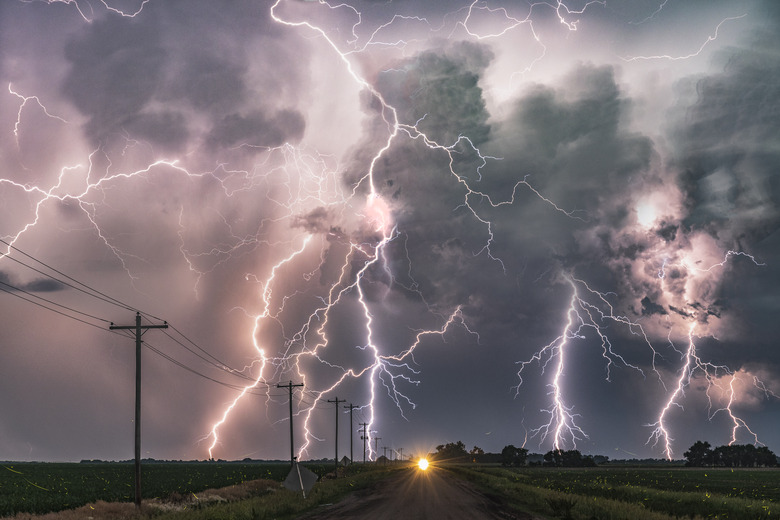Why Does Electricity Go To The Ground?
Even though lightning has been understood by science for quite some time, it's hard not to feel a bit of primal fear when watching those bright bolts split the sky. Lightning, of course, is actually a quick burst of electricity. Electricity (whether it comes from lightning or any other source) heads to the ground as a result of some very basic forces. Basically, clouds filled with tons of negatively charged particles are attracted to the positively charged ground. Once the buildup is large enough, those electrons collect and zip through the sky to a conductor on the ground.
What is Electricity?
What is Electricity?
All matter is made up of atoms. These atoms consist of subatomic particles, including positively charged protons and neutral neutrons. Negatively charged electrons orbit those particles. When those electrons are pulled away from the nucleus of protons and electrons, they flow until they find balance, joining up with other positively charged materials.
Why the Ground?
Why the Ground?
The ground is an attractive place for electricity to flow because it is positively charged, only more so when the tiny particles in the atmosphere collide, filling clouds with negatively charged particles. (These are also called ions.) While many people think that lightning can't hit the same place twice, National Geographic emphasizes this is not the case. High-altitude structures such as skyscrapers and steeples are often struck multiple times.
Grounding: Lightning
Grounding: Lightning
Lightning charges to the ground (most of the time) because of another phenomenon. As the National Agricultural Safety Database emphasizes, electricity takes the path of least resistance. In the case of electricity, that's a beeline straight to the ground.
Grounding: In Your Home
Grounding: In Your Home
Each of the electrical fixtures in your home is grounded as a safety measure. Home Tips points out that, if one of the wires in an outlet broke and touched a conductor (metal, for example), the electricity would flow and could cause a fire or electrocute a person who touched it. The ground wire in an electric outlet is a safety valve; any undesired electricity (positively charged energy) flows to the negatively charged ground, where it wants to go.
The Lightning Rod
The Lightning Rod
Before Ben Franklin invented the lightning rod, homes and other buildings often burned down when struck with lightning. This was a particularly big problem for buildings like churches, which had tall steeples. The lightning rod, a simple metal conductor, is more appealing to electricity than the rest of a building, so it flows straight to the metal and rushes to the ground, reducing the chance of damage to a house.
Cite This Article
MLA
Pendleton, Ethan. "Why Does Electricity Go To The Ground?" sciencing.com, https://www.sciencing.com/electricity-go-ground-5494279/. 5 October 2009.
APA
Pendleton, Ethan. (2009, October 5). Why Does Electricity Go To The Ground?. sciencing.com. Retrieved from https://www.sciencing.com/electricity-go-ground-5494279/
Chicago
Pendleton, Ethan. Why Does Electricity Go To The Ground? last modified August 30, 2022. https://www.sciencing.com/electricity-go-ground-5494279/
